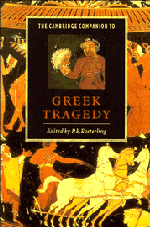8 - Myth into muthos
from Part II - The plays
Published online by Cambridge University Press: 28 May 2006
Summary
TRAGEDY AS REPETITION AND INNOVATION
Tragedie is to seyn a certyn storie
as olde bookes maken us memorie
of hym that stood in greet prosperitee
and is yfallen out of heigh degree
into miserie, and endeth ureccedly
In the Middle Ages, when tragedy as an enactment on stage had been all but forgotten, Chaucer still knew the right shape for a tragic tale. In such a scheme, only the names need be changed, for the form of the tale - and its meaning - always remain the same. Of course, Chaucer's definition is far too restrictive to describe the shapes that Greek tragic plots actually took, but even the much more knowing and differentiated analysis in Aristotle's Poetics, from which Chaucer's notion of tragedy ultimately derives, appears to certify only some of the plots used by the tragedians as properly tragic. Still, it is clear that in practice not any subject was a tragic subject, not any plot-shape suitable to the requirements of the tragic stage. First, the plots of Greek tragedies were drawn largely from a limited repertoire of legends, the great cycles in which the Greeks came to terms with their own past - the stories of 'a few families', as Aristotle says, above all the legendary histories of Troy and Thebes.
- Type
- Chapter
- Information
- The Cambridge Companion to Greek Tragedy , pp. 178 - 208Publisher: Cambridge University PressPrint publication year: 1997
- 30
- Cited by

